Harakiri Blu-ray Movie
HomeHarakiri Blu-ray Movie 
切腹 / Seppuku / Masters of Cinema / Blu-ray + DVDEureka Entertainment | 1962 | 133 min | Rated BBFC: 15 | Sep 26, 2011
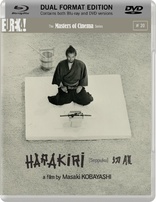
Movie rating
8.9 | / 10 |
Blu-ray rating
| Users | 4.5 | |
| Reviewer | 4.0 | |
| Overall | 4.4 |
Overview
Harakiri (1962)
Following the collapse of his clan, an unemployed samurai arrives at the manor of Lord Iyi, begging to be allowed to commit ritual suicide on the property. Iyi's clansmen, believing the desperate ronin is merely angling for a new position, try to force his hand and get him to eviscerate himself—but they have underestimated his beliefs and his personal brand of honor.
Starring: Tatsuya Nakadai, Akira Ishihama, Shima Iwashita, Tetsurô Tanba, Masao MishimaDirector: Masaki Kobayashi
| Foreign | Uncertain |
| Drama | Uncertain |
| Period | Uncertain |
Specifications
Video
Video codec: MPEG-4 AVC
Video resolution: 1080p
Aspect ratio: 2.42:1
Original aspect ratio: 2.35:1
Audio
Japanese: DTS-HD Master Audio 2.0
Subtitles
English
Discs
50GB Blu-ray Disc
Two-disc set (1 BD, 1 DVD)
DVD copy
Playback
Region B (locked)
Review
Rating summary
| Movie | 5.0 | |
| Video | 4.5 | |
| Audio | 4.5 | |
| Extras | 2.5 | |
| Overall | 4.0 |
Harakiri Blu-ray Movie Review
Reviewed by Dr. Svet Atanasov August 12, 2011Winner of the Jury Special Prize at the Cannes Film Festival, Masaki Kobayashi's "Seppuku" a.k.a "Harakiri" (1962) arrives on Blu-ray courtesy of British distributors Eureka Entertainment. The supplemental features on the disc include the film's original Japanese theatrical trailer and a video interview with Masaki Kobayashi conducted by fellow director Masahiro Shinoda. The disc also arrives with a 28-page illustrated booklet featuring a new essay by film critic Philip Kemp, a 1963 interview with director Masaki Kobayashi, and rare archival production stills. In Japanese, with optional English subtitles for the main feature. Region-B "locked".
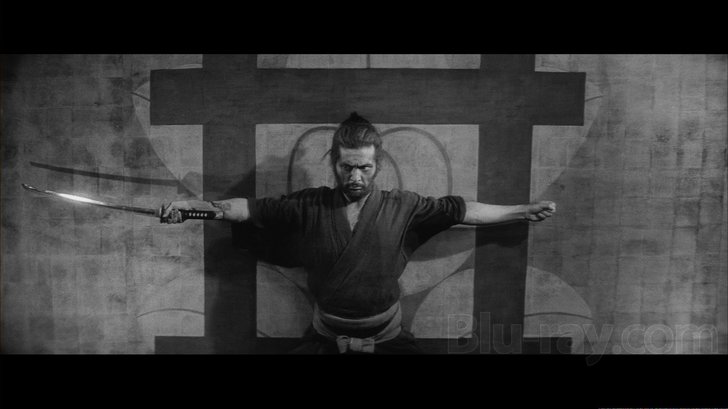
Tatsuya Nakadai as Hanshiro Tsugumo
Japan, 1630. Disillusioned ronin Hanshiro Tsugumo (Tatsuya Nakadai, Yojimbo, Kagemusha) enters the manor of Lord Lyi and asks for permission to commit harakiri (self-inflicted disembowelment). The clan's leader, Kageyu Saito (Rentarô Mikuni, The Burmese Harp, Vengeance Is Mine), is reluctant to grant his wish because he suspects that Hanshiro is simply looking for charity -- like Motome Chijiiwa (Akira Ishihama, Namida, Day-Dream), another masterless ronin, who not long before Hanshiro attempted to cheat the wealthy clan.
But Hanshiro insists that he has made up his mind and is indeed ready to die -- with a proper ceremony. Intrigued and sensing that Hanshiro is sincere, the clan's leader decides to hear his story to determine whether to grant his wish or ask him to leave.
Hanshiro begins his story...
Harakiri is brutal, dark and deeply unsettling, lacking the glamor of Akira Kurosawa’s samurai films. Almost immediately after Hanshiro enters the manor of Lord Lyi it becomes obvious that he is a different kind of ronin, fearless but disillusioned and angry at the system he belongs to, desperate and sad. Kurosawa’s ronin are proud and optimistic men, comfortable in their own skin, fitting well into the samurai system. Hanshiro is the exact opposite of what they are -- he is an outcast, a man who despises the culture and philosophy he represents.
The legendary Tatsuya Nakadai essentially plays three different characters in Harakiri. The first time Hanshiro appears on the screen he is a fearless warrior. He immediately creates the impression of a man who always speaks the truth. Later on, a series of flashbacks reveal his human side. During the final third of the film, Hanshiro becomes an animal and anger takes over his body.
Directed by acclaimed Japanese filmmaker Masaki Kobayashi, who also directed the monumental nine-and-a-half-hour drama The Human Condition, Harakiri is a powerful condemnation of a feudal system and the hypocrisy and cynicism it has fostered. It is also an effective statement in favor of individualism, and specifically the notion that an individual can challenge and change the ethical standards of an unjust social system.
The film is brilliantly lensed by cinematographer Yoshio Miyajima (Kwaidan, Empire of Passion). Long shots and fast zooms are used with incredible precision, giving the film a distinctively contemporary look.
The film also boasts a spectacular music score, arguably one of the best ever conceived for a Japanese period film, courtesy of acclaimed composer Toru Takemitsu (Woman in the Dunes, Double Suicide) -- a variety of minimalistic biwa solos enhance the tense atmosphere throughout the film remarkably well.
Note: In 1963, Harakiri won the Jury Special Prize at the Cannes Film Festival. During the same year, the film also won Best Actor Award (Tatsuya Nakadai) at the Kinema Junpo Awards and Best Film, Best Film Score, Best Art Direction (Junichi Ozumi Shigemasa Toda) and Best Sound Recording (Hideo Nishizaki) Awards at the Mainichi Film Concours.
Harakiri Blu-ray Movie, Video Quality 
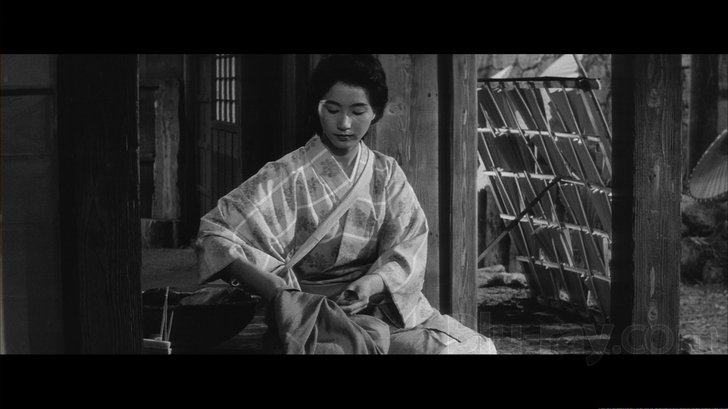
Presented in an aspect ratio of 2.42:1, encoded with MPEG-4 AVC and granted a 1080p transfer, Masaki Kobayashi's Harakiri arrives on Blu-ray courtesy of British distributor Eureka Entertainment.
The new, officially licensed from Shochiku high-definition transfer which Eureka Entertainment have used for their Blu-ray release of Harakiri is quite impressive. Detail is dramatically improved even during the darker sequences from inside Motome's house, while some of the outdoor fights look truly spectacular (see screencapture #4). Colors look richer and healthier -- the small color pulsations from Criterion's SDVD release of the film are practically eliminated and overall the image is much more fluid. Contrast levels are very pleasing, but it will be interesting to see how Criterion's upcoming Blu-ray release will compare as I have a feeling that they will likely boost the blacks. Furthermore, even though certain sequences look a bit soft, I did not see any traces of post-production filtering. Naturally, considering Eureka Entertainment's policy to use raw high-definition transfers (avoiding post-production corrections) for their Bu-ray releases, I believe that all of the minor image fluctuations are inherited. Edge-enhancement is never an issue of concern. I also did not spot any macroblocking patterns. Lastly, there are no large cuts, warps, stains, or damage marks. All in all, this is a very strong presentation that should please fans of Harakiri. (Note: This is a Region-B "locked" Blu-ray disc. Therefore, you must have a native Region-B or Region-Free PS3 or SA to access its content).
Harakiri Blu-ray Movie, Audio Quality 
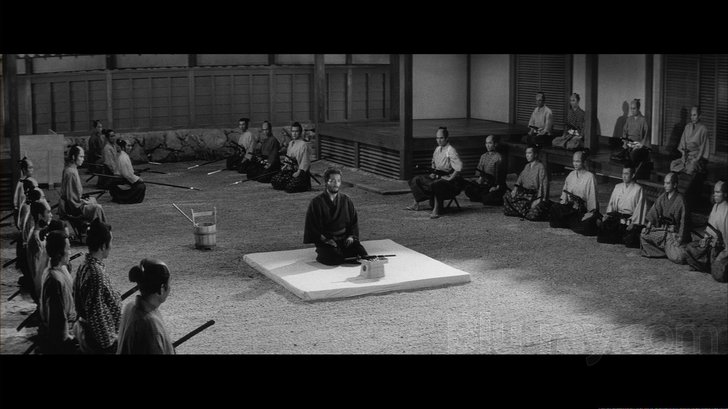
There is only one audio track on this Blu-ray disc: Japanese DTS-HD Master Audio 2.0. For the record, Eureka Entertainment have provided optional English subtitles for the main feature. When turned on, they appear inside the image frame.
Amongst samurai films, Masaki Kobayashi's Harakiri has one of the most memorable soundtracks, courtesy of the great Toru Takemitsu. Some of the best sequences in the film are complimented by very atmospheric biwa solos that give the film a very unique flavor.
The Japanese DTS-HD Master Audio 2.0 track opens up the film wonderfully well. The biwa solos are lush and evocative, always clear and never distorted, while the dialog is crisp, clean, and stable. Pops, cracks, and excessive hiss have also been removed. The new and improved English translation is also excellent.
Harakiri Blu-ray Movie, Special Features and Extras 
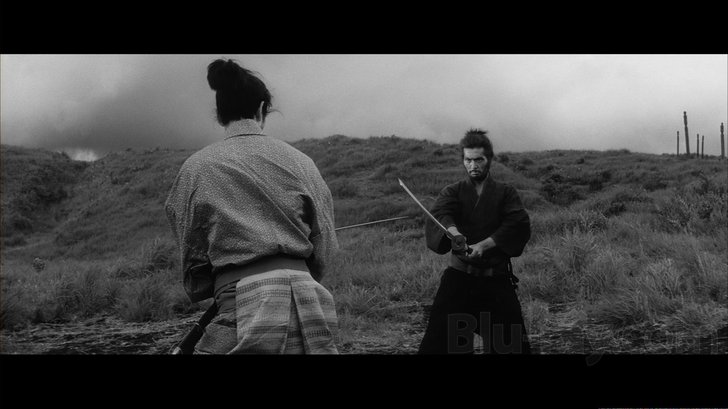
- Trailer - the original Japanese theatrical trailer for Harakiri. In Japanese, with optional English subtitles. (4 min, 1080p).
- Interview - a short but very good interview with Masaki Kobayashi conducted by fellow director Masahiro Shinoda. The two directors discuss the success of Harakiri, the graphic scenes in the film, Toru Takemitsu's terrific score, etc. The interview was filmed for the Directors Guild of Japan, on October 14, 1993, at the Haiyuza Theatre, Tokyo. In Japanese, with optional English subtitles. (10 min, 1080p).
- Booklet - a 28-page illustrated booklet featuring a new essay by film critic Philip Kemp, a 1963 interview with director Masaki Kobayashi, and rare archival production stills.
Harakiri Blu-ray Movie, Overall Score and Recommendation 
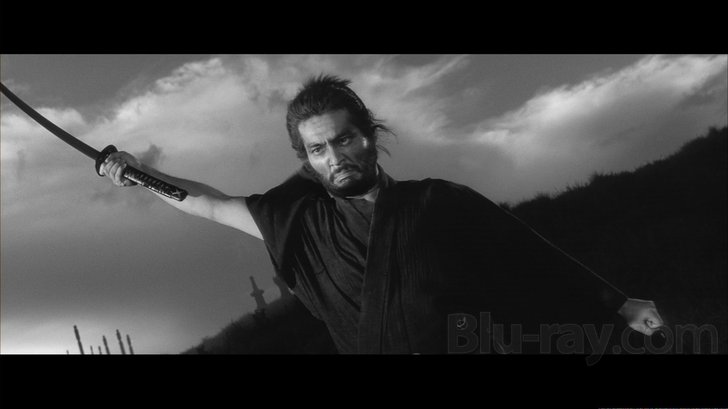
Dark and brutal, Masaki Kobayashi's Harakiri is a powerful condemnation of samurai philosophy and the hypocrisy of the feudal system in Edo era Japan. Arriving for the first time ever on Blu-ray, courtesy of British distributors Eureka Entertainment, the film looks gorgeous, the best it ever has. VERY HIGHLY RECOMMENDED.
Similar titles
Similar titles you might also like

Sansho the Bailiff
山椒大夫 / Sanshô dayû
1954

The Human Condition I: No Greater Love
人間の條件 / Ningen no jōken
1959

The Human Condition III: A Soldier's Prayer
人間の條件 / Ningen no jōken
1961

The Human Condition II: Road to Eternity
人間の條件 / Ningen no jōken
1959

Throne of Blood 4K
蜘蛛巣城 / Kumonosu-jô
1957

Kuroneko
藪の中の黒猫 / Yabu no naka no kuroneko / Masters of Cinema
1968

Tokyo Story
Remastered | 東京物語 / Tôkyô monogatari
1953

The Sword of Doom
大菩薩峠 / Dai-bosatsu tôge
1966

A Brighter Summer Day
牯嶺街少年殺人事件 / Gǔ lǐng jiē shào nián shā rén shì jiàn
1991

Three Outlaw Samurai
三匹の侍 / Sanbiki no samurai
1964

The Life of Oharu
西鶴一代女 / Saikaku ichidai onna
1952

Kagemusha
影武者
1980

Ikiru
生きる
1952

Hara-Kiri: Death of a Samurai
一命 / Ichimei
2011

Yi Yi
一一 / A One and a Two
2000

Ran 4K
乱 / Vintage World Cinema
1985

Onibaba
鬼婆 / The Demoness / Masters of Cinema
1964

Sisters of the Gion
Gion no shimai
1936

Dreams 4K
夢 / Yume / Akira Kurosawa's Dreams
1990

High and Low
天国と地獄 / Tengoku to jigoku
1963